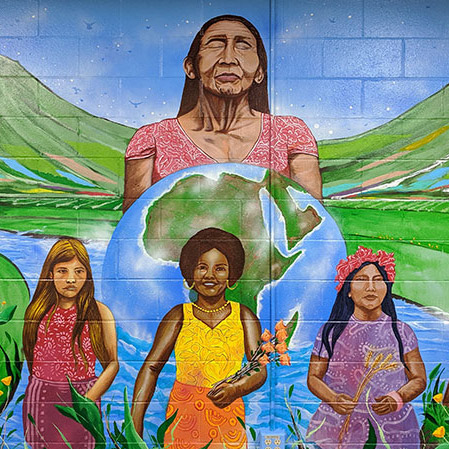Master of Divinity (MDiv)
The Master of Divinity (MDiv) prepares students to serve as rostered leaders in the ELCA and other Christian denominations for both traditional and emerging forms of faith communities, their neighborhoods and the world through a unique program of theological, biblical, ministerial and contextual studies.
The MDiv curriculum is designed to form leaders for transformational ministry in today’s rapidly changing environment. All of the MDiv courses focus on the connection between cultivating a life-giving relationship with God and faithful social transformation. Students will learn to interpret Scripture, faith traditions, and contexts through the lenses of race, class, gender and earth in order to relate the good news of Jesus Christ to society’s most pressing challenges.
Build Your Degree
PLTS offers a variety of options toward completing the MDiv. Choose the option that makes the most sense for your life and work circumstances and that prepares you for your vocational goals.
1. Choose Your Pathway
PLTS offers three pathways toward completing the MDiv. All pathways can be completed in either the residential or distributed learning format.
- 4 Years: The MDiv Pathway
The MDiv pathway is a full-time program of four years of research-oriented, practical, and contextual learning. This includes 3 years of coursework and 1 year of full-time internship. - 5 Years: The MDiv Flex 9 Pathway
The MDiv Flex 9 pathway is a three quarter-time program of four years of research-oriented, practical, and contextual learning. This includes 4 years of three-quarter time coursework and 1 year of full-time internship. - 6 Years: The MDiv Flex 6 Pathway
The MDiv Flex 6 pathway is a half-time program of five years of research-oriented, practical, and contextual learning. This includes 5 years of half-time coursework and 1 year of full-time internship.
2. Choose a Concentration (optional)
MDiv students can also choose to pursue one of these concentrations:
 Climate Justice & Faith
Climate Justice & Faith
Empowering leaders to cultivate moral, spiritual, and practical power for the work of climate justice in communities of faith.
More about the MDiv:
- Curriculum and Degree Requirements
- Admission Requirements
- Evangelism & Justice Concentration
- Climate Justice & Faith Concentration
A Bold Vision for Forming Leaders
The PLTS MDiv program equips leaders for ministry in today’s world by teaching from the following orienting perspectives:
Nurturing a life-giving relationship with God includes embracing and sharing the life-changing power of God’s love through Jesus and cultivating spiritual practices and skills for building community that strengthens people spiritually.
Intellectual engagement with Scripture, faith traditions, and the world involves hearing and interacting with theological voices from the margins of power and privilege and putting Christian beliefs and practices into collaborative engagement with other religious traditions and secular disciplines.
Faithful social transformation grounded in the good news of Jesus Christ endeavors to build communities of resistance and hope by integrating the spiritual and political dimensions of life through theological reflection, social analysis, and implementing strategies to work for justice and ecological healing.
Learning through a socio-ecological lens looks at race, class, gender, and earth in order to develop competencies for effective community engagement in diverse cultural and political contexts.
